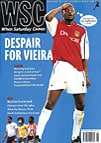 Kate Hoey lost her job as sports minister after the general election, to no one's great surprise. John Williams looks back at her term and argues that her views on Wembley were sound , but doomed
Kate Hoey lost her job as sports minister after the general election, to no one's great surprise. John Williams looks back at her term and argues that her views on Wembley were sound , but doomed
Her arrival was a blaze of brave talk and controversy, her departure something of a whimper followed by a series of moans in the Mail on Sunday, no less. In retrospect, appointing as sports minister in this particular government a women such as Kate Hoey was high risk stuff. Hoey has no strong objections to foxhunting, is at odds with her own government’s policy in countenancing a return to terracing in football stadiums, and, laudably, would rather see decent changing rooms at grassroots for all athletes in all sports than see England host the 2006 football World Cup finals.